-
KOSPI 2577.27 -2.21 -0.09%
-
KOSDAQ 722.52 -7.07 -0.97%
-
KOSPI200 341.49 +0.02 +0.01%
-
USD/KRW 1396 -2.00 0.14%
 Future Unicorns
Future Unicorns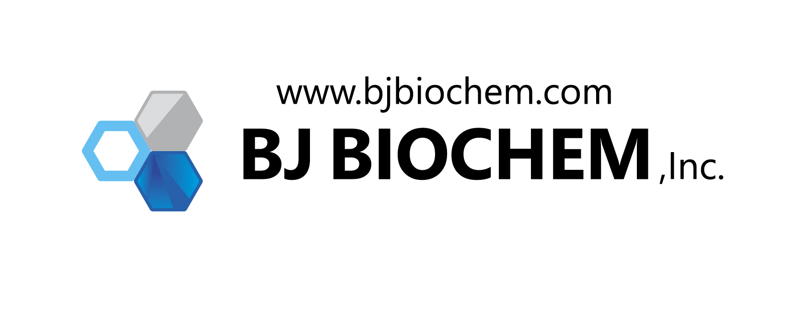
BJ BIOCHEM
Biochemicals
BJ BIOCHEM Inc. is a startup that develops differentiated materials in the preservatives, disinfectants and surfactants sectors. The company specializes in developing a new molecular structure that fundamentally resolves the issue of harmful materials used in sterilizing and preservative substances.
Published: 2022-10-21 11:50:33
Last updated: 2022-11-04 13:05:01
- Story
- Data
Developing safer bio-based personal care materials
Leader in preservatives and disinfectants that are harmless to humans, and surfactants with lower environmental impact
BJ BIOCHEM Inc. is a startup that develops various specialty materials in the preservatives, disinfectants and surfactants sectors.
The company specializes in developing new molecular structures that fundamentally resolve the issue of harmful materials used in sterilization and preservative substances.
Notably, it is innovating personal care surfactants that use glucose — which is harmless to humans — and other surfactants that drastically reduce carbon emissions.
As of August 2022, it had secured patents for 12 related materials. In June, the Ministry of SMEs and Startups selected BJ BIOCHEM as one of 100 startups to watch for in the materials, parts and equipment sector.
BJ BIOCHEM’s slogan is “Green & Sustainable Environmental Health and Safety.”
The startup's founder and CEO Jeong Gug-in described the status of Korea’s materials market as follows: “It’s an attractive space where danger and opportunity coexist. Because both preservatives and surfactants directly impact the body, customers are sensitive to these products and there is always a need for developing alternative materials.”
Dr. Jeong said most of the source technology is possessed by European conglomerates, namely Germany’s BASF SE and Unilever PLC in the United Kingdom.
“Our goal is not to localize the materials already developed by global conglomerates but to manufacture our own unique materials,” Jeong stressed.
Contents
Click to move to each section
- [How it began] 26 years of consumer product development
- [Technological strengths 1] Bio-based materials that control germs and viruses
- [Technological strengths 2] Palm oil-free surfactant
- [Revenue model] Anti-aging products using glucose
- [Unique positioning] Safe alternative materials
- [Team building] Visting in person to recruit the best talent
- [Scalability] Expanding use cases
- [Challenges] Certified safety
- [Funding] IPO scheduled for 2027
[How it began] 26 years of consumer product development
He worked on developing a wide range of consumer goods in the first 20 years and segued into the materials research team for the last six. Among others, he was involved in the creation of fabric softener Saffron and dishwashing liquid Jayeonpong.
During the product development process, Dr. Jeong became intrigued with raw materials, fueling his interest in the materials sector.
“Companies that manufacture products for babies want base materials that are optimized for use on babies,” he explained. “In reality, there is not much difference between base materials for babies and those for adults.”
Dr. Jeong wanted to tap into the market for providing specialized materials to researchers who develop products that target certain demographics, such as infants.
After leaving LG H&H, he prepared to start his own business while providing technical consulting to Isu Chemical Co.'s new business department.
It is not easy for small- and mid-sized companies to enter the materials market. The situation is even harder for startups.
That’s because while the market is broad, the business can fold overnight if there are any unfortunate events involving toxicity.
“Localizing materials has a very low profit margin,” Dr. Jeong said, adding that internal competition leads to what he described as 'eating one’s own flesh.'"
Looking to the future, Dr. Jeong said: “Our role is to develop alternative base materials that the market wants. Based on nearly 30 years of experience in the materials sector, I was confident that developing alternative materials for preservatives and surfactants could provide a competitive edge for a manufacturing sector startup.”
[Consumer behavior] Observation of consumer psychology on disinfectants and preservatives
Dr. Jeong spent a lot of time studying the spending patterns and psychology of Korean consumers, who are very particular about materials. At the same time, he reviewed countless videos and apps that introduce the materials.
“I think it is desirable to provide information that customers may have missed and make it accessible,” he said. “But it becomes problematic when a lot of people are doing so – with some of them not professional enough and spreading misinformation.”
One time, he was attacked online as a swindler.
“I read some explanations about materials on a website that discusses disinfectants, preservatives and surfactants,” he explained. “But the labeling was off and written in a way that readers could mistake the materials as being hazardous.”
When he posted a comment on the site saying the labeling was incorrect, some users asked him to prove that the material was harmless.
“There are too many so-called experts,” Dr. Jeong said.
He underscored that he'd like to break the stereotype of disinfectants and preservatives being harmful to humans.
“Disinfectants and preservatives are just like most other chemical substances that we encounter daily,” Dr. Jeong said. “Through the materials we develop, I hope to nudge the everyday consumer perspective of these products in a positive direction.”
[Technological strengths 1] Bio-based materials that control germs and viruses
Disinfectants and preservatives are business groups that conjure up negative connnotations as being carcinogenic substances or being toxic.
At the center of safety controversies surrounding consumer products are disinfectants and preservatives. Per the revised Chemical Products Safety Act, Korean authorities will gradually reinforce regulations on industry components for disinfectants and preservatives. This falls in line with international trends and shows that the market is in dire need of alternative materials.
Lack of proper oversight can lead to major damage as in the case of the humidifier disinfectant. Sometimes, if there is negative press, companies must recall an entire batch of products. Manufacturers of end products have an enormous need for safe alternative materials.
The disinfectants and preservatives sector is a huge market dominated by multinationals. Even so, the development of alternative materials is not very active.
“Perhaps there is not much development of alternative materials because of the stereotype that toxicity is inevitable in this sector,” Dr. Jeong said.
The disinfectants and preservatives commonly used in the global market control microorganisms through biological means, which are effective in terms of both cost and performance. But the big drawback there is that the approach can also harm human cells.
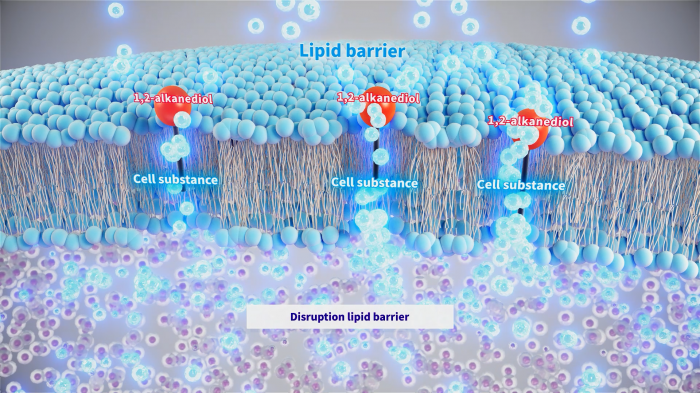
BJ BIOCHEM developed a molecular structure that selectively targets cytoderm to avoid harmful effects on humans. The company registered its related ingredients dictionary and has already applied for or registered four patents. It is also in the process of applying for overseas patents.
“The molecular structure shows that even disinfectants and preservatives are fairly safe materials whose costs can be cut significantly,” BJ BIOCHEM explains. Even though the molecular structure is in the early stage of commercialization, it has been successfully adopted in a variety of products.
“We have been expanding our foothold in the market centered around consumer products but have recently begun to explore other industries as well,” said Dr. Jeong. “The agricultural industry has started using the molecular structure and the metals industry is also testing it.”
As soon as a patent application is accepted abroad, the company will move to launch products catering to overseas markets.
[Technological strengths 2] Palm oil-free surfactant
Even in this era, surfactants are still heavily dependent on petrochemicals.
In the early stages of its business, BJ BIOCHEM has been developing materials for bio-based surfactants using glucose and amino acids. An MES is an eco-friendly anionic surfactant made of materials extracted from palm oil. In Europe, the market for MES is growing at a rate of 13% a year.
But there is also criticism from some that MES is harmful to the environment. Companies may use plant-based surfactants for their environmental benefits, but more than 95% of these plants are palm trees.
As the demand for palm oil increases, countries in Southeast Asia are burning tropical rain forests to build palm plantations, which contribute to massive carbon emissions.While palm oil was considered an eco-friendly material until recently, it is now widely considered a leading culprit in global warming. Some European countries are even pursuing a bill to prohibit the use of bio-diesel made of palm oil. Many products are increasingly seeking palm-free certification for their consumer goods.
The problem, however, is that no alternatives to palm oil exist. Unilever recently announced it had invested US$120 million in a startup that’s developing a palm oil alternative for consumer products. BASF has injected 4 billion euros to reduce carbon emissions by 13 million tons by 2025. These developments are indications of how great the demand is in the global arena – a target market for BJ BIOCHEM.
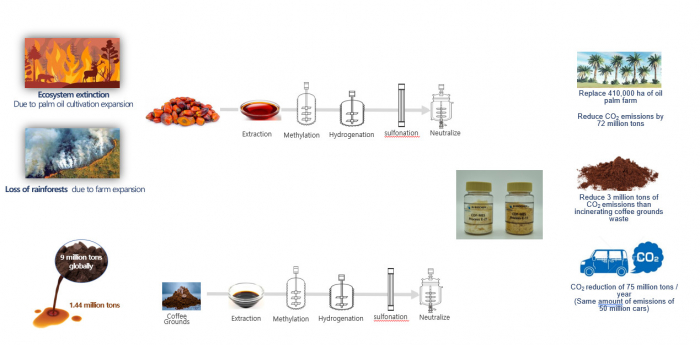
BJ BIOCHEM has developed an entire process of extracting oil from used coffee grounds to replace palm oil in creating MES. At of now, it is working on optimizing this process and applying for patents. The molecular structure of coffee oil is quite similar to that of palm oil, thus making it ideal for creating palm-free MES.
If and when the process developed by BJ BIOCHEM is complete, the company said it can slash carbon emissions by 75 million tons per year and achieve the effect of rendering 4.09 billion m2 of palm plantations unnecessary.
Used coffee grounds are easy to acquire from coffee-making factories. If BJ BIOCHEM can join hands with coffee makers to develop palm-free MES with used coffee grounds, it will be a win-win situation for it and the coffee companies.
[Revenue model] Anti-aging products using glucose
Polysaccharide is the base material in which to create a structure optimized for moisture retention and age prevention. Glyceryl glucoside in particular is plant-based and effective in these anti-aging actions. BJ BIOCHEM is the second in the world, trailing only BASF, to succeed in the mass production of organic synthesis of glyceryl glucoside.
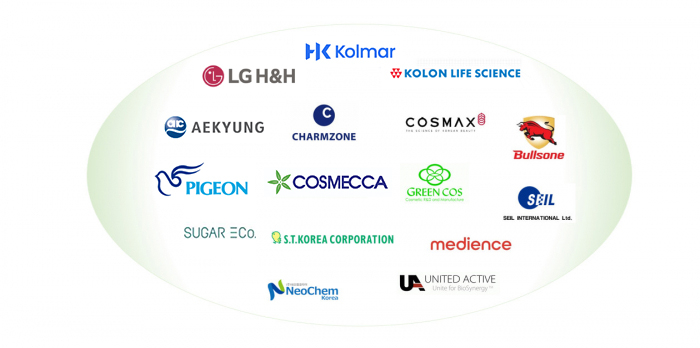
The company's joint production with conglomerates and SMEs, namely LG Household & Health Care, AEKYUNG Industry and Kolon LifeScience, are contributing to the rapid revenue increases. Jeong said, “In the case of LG H&H, it rarely works with companies founded by its former employees but it made an exception for BJ BIOCHEM due to the effectiveness of its bio-based anti-aging material.”
The startup has built its networks by explaining its core technology and potential to conglomerates and working on collaborative projects with them.
BJ BIOCHEM sometimes develops materials outside of its expertise. Kolon Life Science Inc. is one of its clients with which it is working on mass production of electronic and chemical materials, as well as anti-bacterial and anti-virus materials. These materials are integral in various electronic equipment including semiconductors. Dr. Jeong said he is continuously appealing to conglomerates to discover how BJ BIOCHEM’s various materials and materials currently in development are different from the existing products. He added that increasingly clients are recognizing the difference.
[Unique positioning] Safe alternative materials
The chemical and bio sectors are business groups that suffer from safety issues. The direction that BJ BIOCHEM will take is developing differentiated materials for a sizable market that has great demand for alternative materials.
BJ BIOCHEM is not a startup creating a new market. Instead, it is making alternative materials that are needed in the existing market. The company is determined to show that cutting-edge startups can emerge from the manufacturing sector.
[Team building] Visting in person to recruit the best talent
His strategy is to always be on the hunt for talent.
Dr. Jeong looks for the right talent based on the projects the company is pursuing. Eight out of the company's 17 employees are R&D researchers, mostly recruited from Daedeok Innopolis, formerly known as Daedeok Science Town.
The materials research, sales, and factory managers are all subject area experts. BJ BIOCHEM’s director of research is Dr. Ryu Jae-chun, a professor at the prestigious Pohang University of Science and Technology (POSTECH). Sales manager Shin Jae-sung has 26 years of sales and marketing experience in personal care, most recently as the head of the sales team at AK Chemtech. Kwak Hyeong-sub, manager of the plant, was a researcher at the Korean cosmetics company Neopharm.
[Scalability] Expanding use cases
In the case of BJ BIOCHEM’s main preservative CREDO® AB Series, it is used not only for consumer ingredients in cosmetics and dishwashing liquids but also in baby products and clothing. A BJ BIOCHEM employee said, “disinfectants and preservatives are going to be more widely used in different industries, beyond the general public’s imagination.” The company explained that without such products, semiconductors will not last and that electronic devices will quickly be ruined.
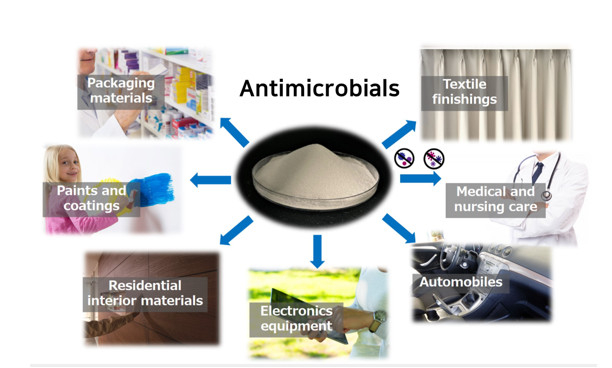
[Challenges] Certified safety
Disinfectants and preservatives need to pass a string of increasingly strengthening regulations in South Korea and overseas. To meet South Korean legal standards, it costs at least 1 billion won to accumulate the necessary paperwork to prove the new materials’ safety. The company predicted that such high costs would drive most South Korean companies to give up on receiving such permits and only global companies would survive in the end.
“BJ BIOCHEM is determined to get over this hurdle, which provides a new opportunity to reorganize the market,” Dr. Jeong said. “We are trying to secure proof of safety for our materials through various government-assisted programs.”
Dr. Jeong is hopeful that once the company can meet these challenges, it can obtain the necessary information needed to enter overseas markets.
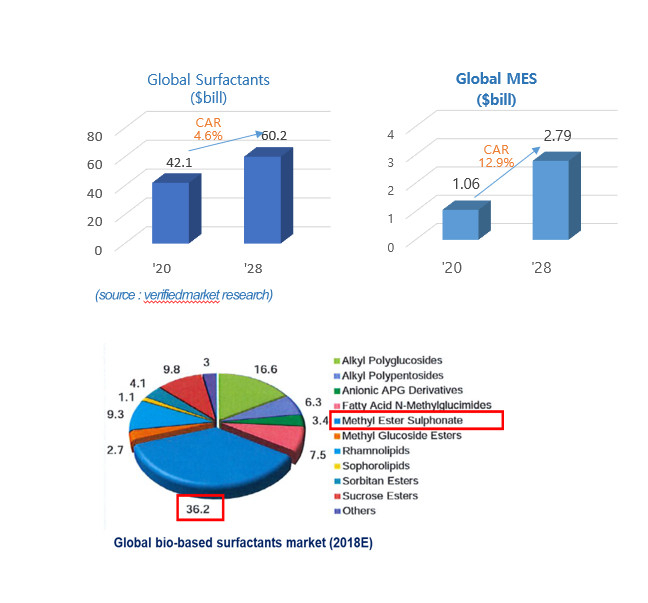
The fundraising effort for BJ BIOCHEM is in the seed round and the company plans to launch the next round in 2023. The company developed bio-based materials using glucose and amino acids in the early stages and was the first in South Korea to commercialize biopolymers.
But demand for biopolymers, mostly used for manufacturing cosmetics, took a hit when stay-at-home measures from the COVID-19 pandemic decreased demand for makeup.
“The biopolymers bring out painful memories in us,” Dr. Jeong recalled. “The material signaled both the company’s hope and despair.”
BJ BIOCHEM built a production plant in Cheongju city, North Chungcheong Province in January 2020. Hit by COVID-19, orders for biopolymers plummeted. That’s when the startup refurbished the plant to manufacture other bio-based materials, disinfectants and preservatives. Thanks to the reshuffle, the business has normalized this year.
“A company that we entered into negotiations with in the latter half of this year signed a contract worth 5 billion won and test production for the particular material is well underway,” Dr. Jeong said.
[Funding] IPO scheduled for 2027
It generated 1.6 billion won in revenue in 2021 and expects the figure to grow to 3 billion this year. The startup is aiming for 71 billion won in annual revenue by 2027.
The immediate goal is to raise funds for the Series A round next year and the long-term goal is to launch an IPO in 2027.
BJ BIOCHEM forecasts future growth as such: “The glucose-based material is expanding its foothold in the market. If the disinfectants and preservatives, which just entered the market, grow well on the back of strengthened regulations, it seems the goals we have set for the next three years are all attainable.”
The expectations are high for surfactant MES production using used coffee grounds The company believes the new material could be an amazing weapon in reducing carbon emissions and for embracing the demand for palm-free options in Europe.
“The goal is to develop a bio-based material using enzymes in the next 10 years,” Dr. Jeong said. The company is developing bio-synthetic materials with the assistance of the Ministry of Trade, Industry, and Energy. “When the material's development is complete, we will be the first one to have manufactured it,” Dr. Jeong said. He added the goal is to grow into a global materials company in 10 years and “to have our name mentioned in publications about global materials.”
By Miah Lee; Edited by Jee Abbey Lee
(mia@hankyung.com )
- [How it began] 26 years of consumer product development
- [Technological strengths 1] Bio-based materials that control germs and viruses
- [Technological strengths 2] Palm oil-free surfactant
- [Revenue model] Anti-aging products using glucose
- [Unique positioning] Safe alternative materials
- [Team building] Visting in person to recruit the best talent
- [Scalability] Expanding use cases
- [Challenges] Certified safety
- [Funding] IPO scheduled for 2027




